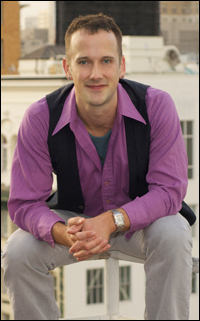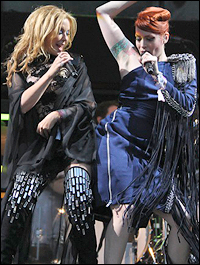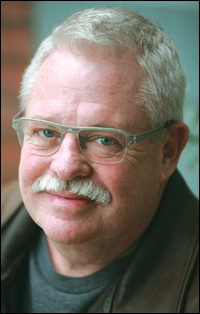
*
Somewhere between the Bee Gees, Elton John and Peaches you'll find the Scissor Sisters, the glam-pop band with downtown New York City roots, whose songs "Take Your Mama," "Filthy/Gorgeous," "I Don't Feel Like Dancin'" and "Invisible Light" have grabbed fans' ears with their insistent hooks since their self-titled debut album was released in 2004.
Though two more albums have followed to acclaim, "Ta-Dah" in 2006 and "Night Work" in 2010, the Scissor Sisters still tiptoe around the mainstream music scene in the U.S., enjoying a cult status and leagues of fans ranging from the downtown scene to Elton John, who has also collaborated on a couple singles. When they opened for Lady Gaga at Madison Square Garden earlier this year, they introduced themselves by saying, "We're the Scissor Sisters and if you don't know who we are, then you're probably not gay, or not British."
That might be about to change. With a host of No. 1 hits in the U.K., platinum albums, sold-out concert tours and an ever-growing U.S. following, the Scissor Sisters' front man Jake Shears and keyboard player John "JJ" Garden have set their sights set on the realm of musical theatre. Collaborating with Tony Award-winning Avenue Q book writer Jeff Whitty and Tony-nominated director Jason Moore (Avenue Q, Shrek), Shears (music/lyrics) and Garden (music) have scored a musical adaptation of Armistead Maupin's beloved fiction series "Tales of the City."
The 1970s-set saga — mysterious, touching and comical — centers around the inhabitants of a small San Francisco boarding house (the magical manse at 28 Barbary Lane) run by the enigmatic pot-smoking landlady Anna Madrigal.
Playbill.com caught up with Shears and Garden, who are putting the finishing touches on Tales of the City prior to its world-premiere May 18 at the American Conservatory Theatre in San Francisco.
As big fan of both the Scissor Sisters and Armistead Maupin's "Tales," this project is sort of my musical theatre dream. How did it come about for you?
Jake Shears: About five years ago Jeff Whitty sent me an e-mail wondering if I'd be interested in working on a musical; we had known [Jeff] for about five years at that point. I asked him what it was about and he said it was "Tales of the City." I was in. I was thrilled. Scissor Sisters were on the road at the time and I asked John to start writing songs with me.
Were either of you fans of the book or miniseries?
JS: I had been a fan of the books, but JJ had never read them.
John "JJ" Garden: I knew the miniseries from when it aired in the U.K. but I got to discover the books for the first time as we wrote, which is exciting.
| |
 |
|
| Jeff Whitty | ||
| photo by Kevin Berne |
JS: I've always been interested in that style of writing. I've definitely had my own kind of taste, and I don't necessarily like, or respond to, a lot of musicals. But, I've always been a fan of certain musicals and have loved the idea of telling stories and narratives through music. That's kind of a device we use a lot in Scissor Sisters music. In my head there are songs that we've written as a band that are kind of like mini-musicals unto themselves.
JG: I think it was interesting once we started the writing process, we became sort of hyper aware of musical theatre as a form we were working in, and to go discover how many shows there are that actually influenced both of us throughout our lives from childhood onwards. Also things that aren't always considered musicals, things like Bugsy Malone, Tommy and Quadrophenia, some of those things that still have the storytelling aspect to it, but haven't necessarily been staged or are associated with Broadway. I think we both made a lot of discovery of things that are in our musical DNA.
Was it a challenge to adapt your writing process — as songwriter-performers you can essentially riff on whatever inspires you — to create character-driven material that drives plot and explores character?
JS: There are certain songs that were real challenges, that we took lots of stabs at until we got it right. But when I'm writing lyrics, and songs for Scissor Sisters, I sing in character a lot of times and I write songs in character with the band. It's a device we use on a regular basis with Scissor Sisters, so it felt really natural for me to write songs as characters who provide new information and move the story along.
How do the two of you write? Lyrics first, music first?
JG: The best situation is that we are in the same room and work it out together. Sometimes Jake will come in with a whole melody already worked out and no lyrics, and just a concept. Other times lyrics first. It's really been different for every song.
JS: We have no formula. I'm still mystified as to how to write a song. We've written most of the show on piano. Tossing ideas back and forth.
| |
 |
|
| The Scissor Sisters perform in Glastonbury. | ||
| photo by Kevin Tachman |
JS: There's a bit of disco in it. I think both of us made a conscious decision not to limit ourselves to a kind of '70s pastiche. My view on the books is that they are very timeless and that's why we're making this show now. It's also why people still read them and they're still in print. It's just a timeless story. I wanted the music to feel timeless as well. Our songwriting already leans into that sort of '70s song craft as it is. So, I thought it was really necessary not to overthink that aspect, and to just set out to write songs naturally and that's what we've done.
JG: There's definitely some surprising stylistic moments that fans of the band and Jake's writing with the band will be surprised by. There's some unusual turns.
This is a really ambitious piece to tackle for the stage. It's sort of Dickensian in scale — the subplots all intertwine and the characters are all somehow connected to one another.
JS: That's a big challenge of Tales of the City, adapting it in that way. I mean right off the top, you've got to be merciless and make big decisions about what stays, what goes and what's going to be the real center of it. Those are big decisions that we had to start making off the top. JG: There was even a moment where someone suggested that we pick one character and make the show about them, but I think we've avoided that quite well. The show still works with a kind of multiple focus. All these characters are so well loved and you don't feel that anyone of them is suffering because one character is being pushed forward.
Novelist Maupin has also been pretty hands-on in the process, I understand. Is it intimidating to adapt his work and then have him view it?
JS: He's been amazing. So helpful and open-minded. He's just so happy that this is happening and he's been a real asset to us. I don't know if we could have really done it without him. I wouldn't have wanted to do it without him. He's been a real rock and always has great insight. It's a pleasure to be friends with him and be around him and work with him. Actually, that's the thing about adapting and what's been so great about Armistead Maupin being a part of this process. There have been liberties taken. You have to do what's going to be best for the musical instead of being married to the original text. But, that said, I think we've been very faithful to the characters.
| |
 |
|
| Armistead Maupin | ||
| photo by Christopher Turner |
JS: The first song we wrote was a song called "Plus One," which Dede sings as she finds out that she's not only pregnant, but pregnant with twins. That was the first bit of the story we musicalized. It was just a matter of finding moments at first that felt like they lent themselves to song. This was before there was a script and we just took moments from the book. Other early songs were "Where Beauty Lies" and "Homosexual Convalescent Center."
"Homosexual Convalescent Center." I love that title already.
JS: It's this party of the "A-Gays," the upper echelon of homos who are singing about where they plan on spending their retirement and the rest of their lives. It's a very funny song, but it's an important song in the show because underneath it — I wanted to acknowledge the fact that this is 1976 and all these men who were singing the song about what they're going to do in their old age — in actuality, a lot of them won't reach their old age. That's something that the audience knows that the characters don't necessarily. There are some left field ideas like that and subject matters that I wanted to broach. I thought it was necessary. There are interesting little pathways that come out in the story like that.
You've been working on the piece for about five years now, right? Theatre folks are pretty used to the workshop process, but that must be a kind of new thing for you guys.
JG: The first workshop at the O'Neill [Center's Music Theatre Conference in 2009] was the first time we had heard anyone else sing the songs from the score and it was so exciting and inspiring. We started writing new material during that workshop because we also started to realize what was possible. It was sort of the first time we saw the potential for all the directions [it could go].
Are the two of you still actively writing during rehearsals?
JS: Unless there are any major surprises coming up, everything's written. Now it's just scalpel work, clarifying every little thing and going through every line. Just shaping and doing all the detail work. It's been really fun. There are still a couple lines I'm stuck on, I have no idea what the hell they'll be. But that's a fun part of it. It's gratifying because you plug stuff like that right into the show and you see it work right away.
It's also pretty special that Tales of the City should debut in its hometown. What are the chances that we'll see it in New York?
JS: There couldn't be any other way [than San Francisco] and I think there probably will be [other productions]. The goal is to make this show the best show it can possibly be for San Francisco. I will be satisfied and happy even if I never saw the show again after San Francisco. It's been such a blast and we're so proud of it. I just want it to be the best show right now. Hopefully it will go on and have a great life.
*
Tales of the City will begin previews May 18 at A.C.T., prior to officially opening May 31. It will play an extended engagement through July 10. The cast features Tony Award winner Judy Kaye (The Phantom of the Opera, On the Twentieth Century, Souvenir) as Anna Madrigal, with Betsy Wolfe (Everyday Rapture, 110 in the Shade) as Midwestern transplant Mary Ann Singleton, Mary Birdsong (Martin Short Fame Becomes Me, "Reno 911") as the free-spirited Mona Ramsay and Wesley Taylor (Rock of Ages, The Addams Family) as Michael "Mouse" Tollivar.
Click here to read Playbill.com's story about the Tales cast.











